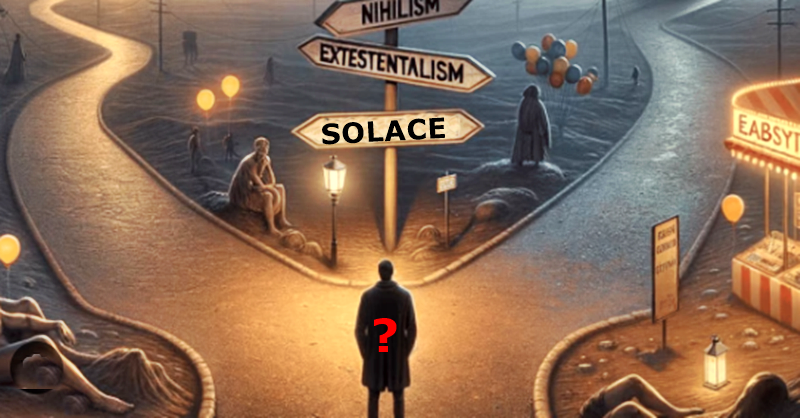A LIFE FROM NIHILISM TO SOLACE.

By ChatGPT-Tome - Human Synthesis-04 May - 2024. Source FB
The poem reflects a profound philosophical journey from nihilism and despair towards finding solace and meaning in the simplicity of life. At first, the speaker embodies a nihilistic, hedonistic worldview, rejecting notions of peace, happiness, and connection.
However, through a series of experiences, including hardship, introspection, and moments of fleeting beauty, the speaker undergoes a transformation. They come to realize the interconnectedness of human experience and the inherent value in small moments of joy and connection.
Ultimately, the poem suggests that amidst life's chaos and suffering, there exists the potential for acceptance, gratitude, and a deeper understanding of the shared human condition.
It's a testament to the resilience of the human spirit and the capacity for redemption and growth.
Throughout the poem, Bukowski juxtaposes moments of darkness and despair with instances of fleeting beauty and connection, emphasizing the contrast between the harsh realities of life and the potential for finding meaning and beauty within them.
The speaker's evolution from a hardened, nihilistic individual to someone who embraces moments of peace and happiness illustrates a philosophical shift towards acceptance and appreciation for the complexities of existence.
Furthermore, Bukowski highlights the transient nature of life and the importance of seizing moments of joy and connection when they arise.
The speaker's newfound ability to embrace moments of peace and happiness, even in the face of adversity, suggests a recognition of the impermanence of life and the value of living in the present moment.
Overall, the poem can be seen as a meditation on the human experience, exploring themes of resilience, redemption, and the search for meaning in a seemingly chaotic world.
It encourages readers to find solace and beauty in the small moments of life, even amidst the struggles and hardships that define the human condition.
Bukowski's poem delves into the depths of human experience with intricate detail, painting a vivid picture of the speaker's journey towards philosophical understanding.
In the beginning, the speaker is consumed by nihilism and despair, describing a life filled with anger, distrust, and a rejection of societal norms.
The list of things the speaker despises serves as a reflection of their disillusionment with the world and their own sense of self. The speaker's experiences of hardship, including alley fights and suicidal thoughts, further reinforce their nihilistic worldview.
However, amidst the darkness, the speaker begins to notice moments of beauty and connection. These moments, whether it's the sight of coffee cups in a cafe or the shape of their wife's head in bed, serve as catalysts for the speaker's transformation.
The speaker starts to appreciate the simplicity and beauty of everyday life, finding solace in small moments of peace and happiness.
As the poem progresses, the speaker's perspective shifts from one of cynicism to one of acceptance and gratitude. They come to understand the interconnectedness of human experience and the inherent value in embracing life's ups and downs.
The speaker's newfound ability to find beauty in the mundane reflects a deeper philosophical understanding of the complexities of existence.
Overall, Bukowski's poem captures the essence of the human condition, illustrating the transformative power of acceptance, gratitude, and finding beauty in life's simplest moments.
It encourages readers to embrace the full spectrum of human experience, recognizing that even amidst darkness, there is the potential for growth, redemption, and moments of profound beauty.
Through vivid imagery and introspective reflection, Bukowski captures the essence of resilience, redemption, and the search for meaning in a seemingly chaotic world. The poem serves as a reminder to embrace the full spectrum of human experience, finding solace and beauty in the midst of life's struggles and hardships.
Ultimately, the poem invites readers to cultivate a deeper understanding of the interconnectedness of human existence and the transformative power of acceptance and gratitude.
By Charles Bukowski.
